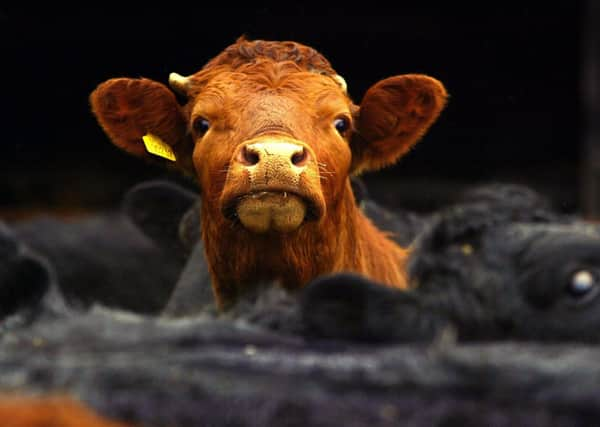Ulster Farmers’ Union lobbied for ‘unequivocal’ government statement on beef safety – months before BSE link to humans, declassified file shows


Files declassified at the Public Record Office in Belfast show that as the farming community faced increasing hardship due to fear of the frightening new illness which could linger in the body for many years without symptoms, the UFU put pressure on ministers to reassure the public.
In a December 7, 1995 letter to NIO minister Baroness Denton, UFU president John Rankin told her that it was essential for the government to take action.
Advertisement
Advertisement
He said that “to restore public confidence in beef an unequivocal statement from the chief medical officer on the facts about BSE and CJD would be extremely beneficial. An advert appearing in the Indedpendent last weekend serves as a useful example of what can be done”.
The following day Mr Rankin wrote to the secretary of state, telling him that “the Beef Scare … has become a CRISIS”.
He went on: “However, what is worse is that this is all based on an emotional outburst following the comments on beef burgers by a retired eminent medical man. Despite all assurances, the problem has escalated and has now become an issue of public health and a loss of confidence in beef.”
A bulky file on the BSE crisis contains the arrestingly sombre March 18, 1996, memo which Westminster secretary of state for agriculture, Douglas Hogg, wrote to the prime minister to convey the news that BSE was believed to be transmissible to humans.
Advertisement
Advertisement
In the first of two memos to John Major that day, he wrote: “You should be aware of a very serious development on BSE. In brief, the CJD Surveillance Unit in Edinburgh appears to have identified a new variant of Creutzfeltd Jakob Disease (CJD) in young people in the UK ... so far as is known, this is unprecedented.”
He said that the government’s expert committee advising on the issue had “been grappling with these findings” and “they have concluded that exposure to BSE is the most likely explanation”.
Mr Hogg went on: “It is clear that the announcement of a new variant of CJD and the acknowledgement by the most official and most eminent body in the field that the transmissibility of BSE to humans is a likely cause, is bound to have a major effect on publi c attitudes and actions.
“It is clear that we will face a major crisis of confidence in British beef ... the financial implications for individuals, for companies and for HMG could be severe.”
Advertisement
Advertisement
Alluding to Tory minister John Gummer infamously feeding a beef burger to his daughter in front of the cameras in the 1980s to persuade the public that beef was safe after the discovery of BSE, he added: “We are sure we will be questioned closely and critically about the public assurances we, our several predecessors, the CMO and others have given that ‘British beef is safe’.”
The file shows that the government considered slaughtering the entire national herd but believed that even this might not eradicate a disease which was then poorly understood.
FROM THE DECLASSIFEID FILES:
Advertisement
Advertisement
Advertisement
Advertisement
——— ———
A message from the Editor:
Thank you for reading this story on our website. While I have your attention, I also have an important request to make of you.
Advertisement
Advertisement
With the coronavirus lockdown having a major impact on many of our advertisers — and consequently the revenue we receive — we are more reliant than ever on you taking out a digital subscription.
Subscribe to newsletter.co.uk and enjoy unlimited access to the best Northern Ireland and UK news and information online and on our app. With a digital subscription, you can read more than 5 articles, see fewer ads, enjoy faster load times, and get access to exclusive newsletters and content. Visit https://www.newsletter.co.uk/subscriptions now to sign up.
Our journalism costs money and we rely on advertising, print and digital revenues to help to support them. By supporting us, we are able to support you in providing trusted, fact-checked content for this website.
Alistair Bushe
Editor